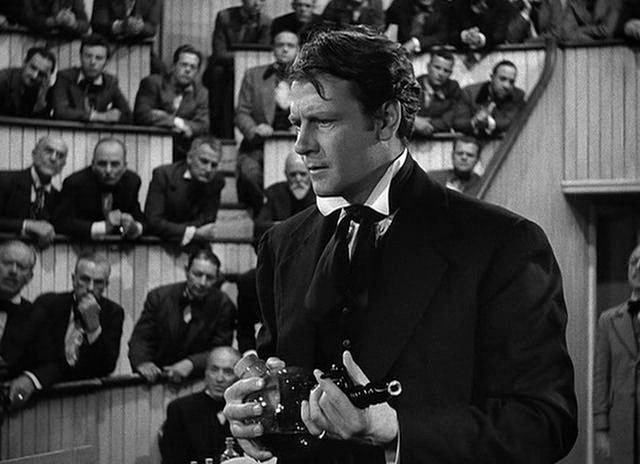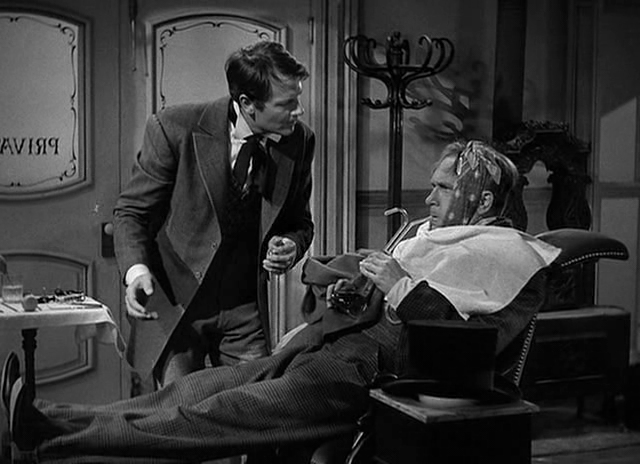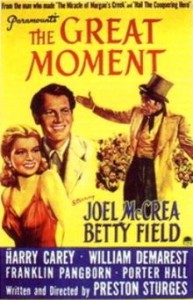|
Genres, Themes, Actors, and Directors:
- Betty Field Films
- Biopics
- Dentists
- Flashback Films
- Historical Drama
- Inventors
- Joel McCrea Films
- Preston Sturges Films
Review:
The Great Moment is surely the oddest entry in Preston Sturges’ estimable Hollywood career, given that the “biopic” genre was about as far removed from his standard milieu of satirical screwball comedies as possible. However, when one recalls that Sturges invented a “kissproof” lipstick in 1920 (!), his personal investment in telling the life story of a notoriously troubled inventor begins to make a bit more sense… Indeed, while The Great Moment doesn’t quite succeed as a classic Sturges outing, one stills feels oddly grateful that this story got made at all — and that it was given at least some semblance of the “Sturges touch”, rather than being told in standard (turgid) Hollywood fashion. Many of Sturges’ stock players show up in the cast, with William Demarest given an especially significant supporting role as the man who is first successfully operated upon by Dr. Morton (McCrea) while under the influence of ether; he and other familiar faces ensure that there’s a steady strain of comedic energy flowing through the film. Other scenes, unfortunately (including most with Betty Field as McCrea’s loyal, pretty wife), come across as disappointingly mainstream; Field’s opening flashback monologue, for instance, is laughably solemn.
Regardless of the film’s overall uneven approach to the material, however, you’re almost guaranteed to get caught up in the tale being told. While Dr. Morton’s story is presented from an unequivocally sympathetic point of view (the opening title card alone lets you know what Sturges’ opinion is on the matter), you’ll likely find yourself questioning his motives nonetheless: what is the right thing to do in a case like this, where one’s breakthrough discovery has the potential to prevent an enormous amount of suffering in the world? Meanwhile, the issue of multiple hands and minds inevitably playing a part in any medical “discovery” is respectfully handled; it’s made eminently clear that, despite Morton’s noteworthy role in persisting with his experimentation until he finally achieves success, he was not working or thinking in isolation.
Redeeming Qualities and Moments:
- Joel McCrea as Dr. Morton

- An interesting depiction of the incipient development of anesthesiology

Must See?
No, though it’s worth a look, and is must-see for Sturges completists.
Links:
|



One thought on “Great Moment, The (1944)”
A once-must, mostly for its depiction of the cutthroat aspect of the world of invention.
A second viewing of this film (the first was many years ago) has led me to respect it. When I first saw it, I probably had not seen such films as ‘Lorenzo’s Oil’ or ‘And The Band Played On’ – two other films which deal with looking for a medical cure and (respectively) obstruction to a cure and a rivalry war over who gets credit for invention. It really does amaze and repulse me when professional backstabbing occurs in a world of people dedicated to easing pain and saving lives. But, of course, when some people play God it’s not only total, it’s also puffed-up.
‘TGM’ takes the stance that Morton is, without doubt, responsible for painless dentistry and operation procedures. Although I would like to read somewhere in print that this is, in fact, undeniable, the defense Sturges makes for his hero reads as solid. Sturges gets strong support from McCrea in a fine performance as Morton. (I am equally impressed by Harry Carey as a top surgeon who desperately needs the assistance anesthesia can bring. ~tho, I don’t have any particular problem with the rest of the cast.)
Some consider this film incomprehensible. At 81 minutes, it does seem a little short for the story it’s telling. Apparently studio execs hated the film (how dare Sturges not aim for another top-drawer comedy!) and yanked the film from him. It was cut considerably and apparently marketed along comedic lines. No surprise that it flopped. Personally, I am surprised, tho, that the film plays better than one might expect. I don’t detect any glaring absence of logic in its progression.
Sturges fans should know that his stamp is all over this film and his humorous touch is quite evident, even if he has set out this time to tell a real-life story. Overall, I find this film to be rather moving in many ways and applaud Sturges for choosing to shed more light on the subject.